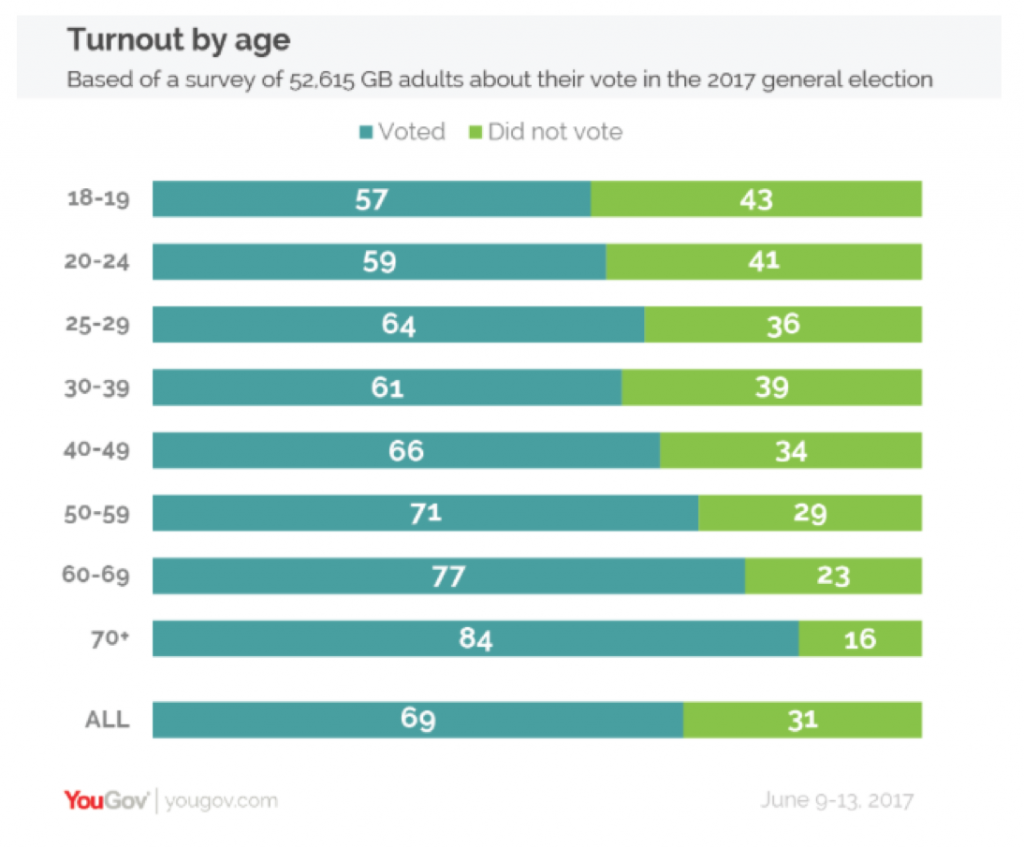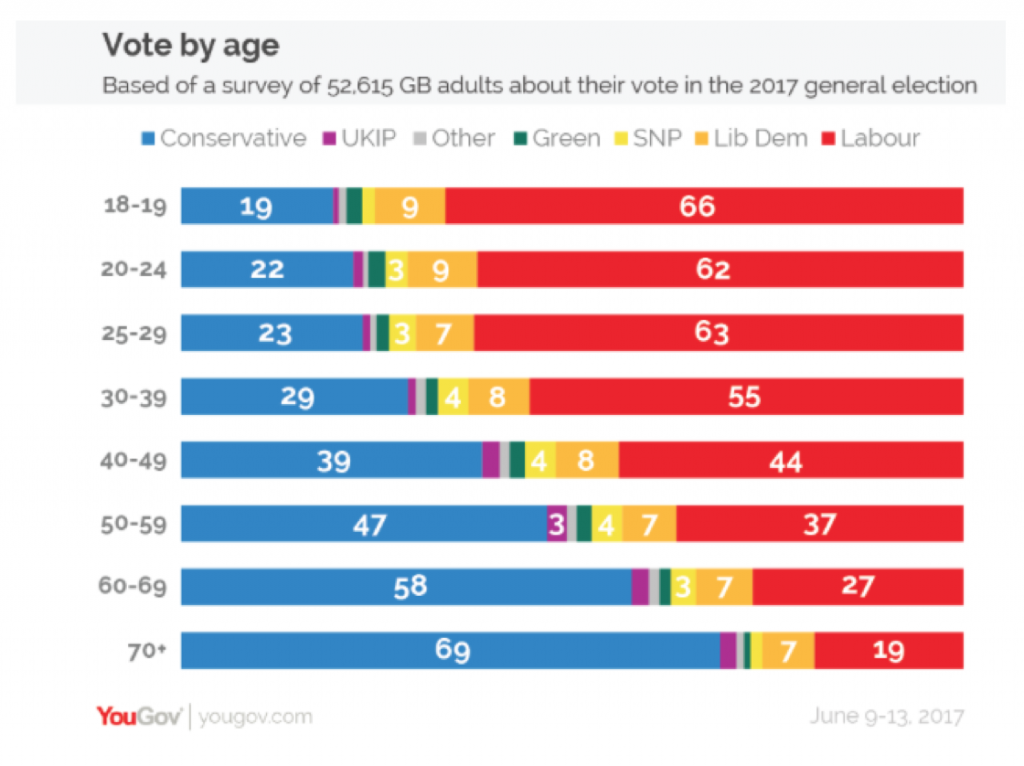
 The last general election brought a number of new voters into the electorate, especially younger ones who having voted for the first time, are more likely to turn out in future contests. Anja Neundorf and Thomas J. Scotto argue that although Labour cannot take their support for granted, for many of them the Conservative option is permanently off the menu.
The last general election brought a number of new voters into the electorate, especially younger ones who having voted for the first time, are more likely to turn out in future contests. Anja Neundorf and Thomas J. Scotto argue that although Labour cannot take their support for granted, for many of them the Conservative option is permanently off the menu.
Beyond the tallying of votes, elections serve as important events which heighten the importance of politics in the minds of many citizens. For young people, the event of their first election can leave behind an endurable mark on their future voting behaviour. Given the apparent increased mobilisation and massive Labour support among young voters, we speculate here about what to expect from this generation in future elections.
The 2017 election and young voters: a recap
Who gets mobilised by specific elections varies considerably. Emerging polling data from the 2017 general election paints a picture that a segment of young voters were very much motivated by Jeremy Corbyn’s anti-austerity message. Estimates of turnout for 18-24 year olds varies between 58% (YouGov) and 73% (Ashcroft), far surpassing the 40% that became the norm from 2001-2015.
The second striking preliminary result of the 2017 election is the distribution of votes for different age groups. According to YouGov, about 64% of 18-29 year olds voted for Labour and just 1 in 5 voted Tory. In 2015, the split between the two main parties was 36% versus 32% in favour of Labour among this age group. Due to cheap membership fees and an anti-austerity message that resonated with students, Jeremy Corbyn’s Labour Party brought many into the political fold and to the polls for the first time. Seeing a surge of young voters will have consequences for the voting behaviour of this generation in future elections.
Loosing the youth: the consequences
The stark difference in support for Labour over the Tories in 2017 will serve to magnify the folly of the Prime Minister’s decision to call an early election – an election than could actually mark the making of a new Labour generation, or at the very least of an anti-Tory generation.
Our own work in the field of voting behaviour suggests the election will serve as a formative event for younger voters. In both the United States and the United Kingdom, research suggests that voting is habitual. Work by political scientist David Cutts and his colleagues theorizes that once people realise how easy it is to get to the polls and cast a ballot, psychological barriers to voting decline dramatically. Voters with records of activity also are easier to mobilise via contact in subsequent campaigns, and this may be particularly true for Labour whose direct membership numbers continue to grow. Once an individual makes the choice to go to the ballot box, they are more likely to do the same in future elections.
Will the youth remain loyal to Labour?
Churchill famously said that “If you’re not a liberal when you’re 25, you have no heart. If you’re not a conservative by the time you’re 35, you have no brain.” Voters who enter the electorate at different ages bring to the ballot box different concerns and this affects the menu of parties they are willing to consider. A student who votes at 18 may have university tuition rates first on their mind and would consider voting for Labour and the Greens. A first time homeowner who is 36 may favour the Tories and fear Labour. The issues citizens feel to be important change over the course of the life cycle, but identification and non-identification persists much as the players on a football team change but fans’ loyalty to the team does not.
Traditionally, researchers view partisan identification as an affective orientation to a particular party, but our research shows that many Britons move into and away from identification with a party. Empirical results from our research using data from the British Household Panel Study from the early 1990s to early 2000s shows that fewer than half of all people who said they supported Labour at one point in time did so every time they were asked the party support question. Many moved in and out of having an affinity for the Labour Party but the most common temporary move away from Labour in this group was to no identification at all.
What we do not witness is many of these floating Labour supporters moving towards any type of support for the Conservative Party. We call this “bounded partisanship”. In short, people are more likely to be stable in telling survey researchers which political party they will never support than consistent supporters of a particular political party.
An outlook
Although it is an oversimplification to frame the 2017 General Election as solely a contest between the young and old, Theresa May and her campaign team badly underestimated the appeal of Jeremy Corbyn’s message to young voters. Labour seemed to have a leader who proved to have a passion and talent for mobilizing the young. The gamble the Prime Minister made in calling an early election will likely have ramifications for the Conservative Party that go well beyond the loss of their parliamentary majority.
The implications of the research cited above suggests that the action likely brought a number of voters into the electorate. Not only are more 18-24 year olds coming into the electorate than ever before, our work also suggests that many are doing so with a “never Tory” mindset. These voters may move to new parties or to non-identification, which means that Labour cannot take their support for granted, but for most, the Conservative option is permanently off the menu.
______
 Anja Neundorf is Associate Professor in the School of Politics and International Relations at the University of Nottingham.
Anja Neundorf is Associate Professor in the School of Politics and International Relations at the University of Nottingham.
 Thomas J. Scotto is Head of the School of Government and Politics at the University of Strathclyde.
Thomas J. Scotto is Head of the School of Government and Politics at the University of Strathclyde.









Perhaps, this might suggest why the Tories and government refuse to grant voting rights to 16 year-olds,unlike Scotland. I predict that the Tory and government will redouble efforts to ignore and prevent 16 year-olds from getting the vote. Polls are very blinkered, they have to be. When I came to this country in 1976 from California, I brought my education with me. I was surprised at the attitude of “never Tory” that I encountered. I was 31 at the time. The amusing famous quote of Winnie that you mention, is more interesting from a historical and biographical standpoint than the facile political impact that it, and he, had. Churchie was a man of the past, another era. What would he think of Britons today? Churchill was pro-EU at the beginning of the 2nd half of the 1914-1945 war. That was not an original idea. George Washington was for it as well. Tom Paine was the one who forsaw the United States of Europe. He would, wouldn’t he, because The United States of America was his own original title for the new nation. Norralorra people know that. It’s interesting to note your examples of what/why people vote for. It is clear that the choices are singularly only to do with selfishness. Narrow-mindedness and short-sightedness does, I suggest, characterise and identify the British mentality of all age groups. Some might say that the latest general election was about Brexit. That can be argued in the same dishonest way that the referendum was, and continues, to be argued with lies, propaganda, phony debates, gerrymandering and everything possible against democracy including the kitchen sink. Britain is an insular collection of uncomfortable countries. Most of the young, it is said, are against Brexit and for Remain. But, they voted for a full English hard Brexit when they voted Labour. So, what were they thinking? Brexit will prevent and destroy the Labour manifesto and every manifesto for 3 hundred years at least. If you are committing national suicide, it will take at least that long to fill a swimming pool with a teaspoon. “When politics becomes more important than business, it’s time to invest abroad.” The powerful truth of this quote far transcends Orson Welles in Voyage of the Dammed. the British apparently do not understand this because of the illiteracy, bigotry, xenophobic chauvinism, lack of information and bad education, all of which now describes Great Britain. “Brexit Noir”(Norman English) is what I call it. The mess, that is Britannia, will continue to launch the nation further and further away from the fantasy dream-memory of Empire. The only empire will be world union or extinction. The insular Britons who are not rich will continue to live in Grenfell Towers with Hillsborough terraces.Good luck with that.
Eurosceptics are keen to point out that Churchill’s reference to a United States of Europe (e.g. in his 1946 Zurich speech) would not include Britain. However, in 1945, his wife told Lord Moran:
Winston is non-party; he makes up his mind on questions as they strike him. He said to me yesterday: “If I were ten years younger I might be the first President of the United States of Europe[emphasis added].”
Source: Winston Churchill: The Struggle for Survival, 1940-1965, p247 (Hardback edition).
Good point, also valid. I had in mind Churchill’s other suggestion and proposal (behind the scenes) of Britain joining up with France, but I don’t have the reference information to hand.
The proposed Franco-British Union in June 1940?
The two Governments declare that France and Great Britain shall no longer be two nations, but one Franco-British Union.
The constitution of the Union will provide for joint organs of defence, foreign, financial and economic policies.
Every citizen of France will enjoy immediately citizenship of Great Britain; every British subject will become a citizen of France.
http://ukwarcabinet.s3.amazonaws.com/documents/cab-65-7-64-0001.pdf
Yes, that’s the one Churchill favoured, thank you for identifying it and reminding me. I wonder if it’s just a coincidence that my coinage: “Brexit Noir”(Norman English) was the same word (“black”) that Churchill later used for Britain not being part of Europe? Or, is it just obvious?
What would he [Churchill] think of Britons today?
Perhaps amazed we decided to withdraw from being one of the EU’s big decision-makers (e.g. promoters of the Internal Market & enlargement) and may now end up as a rule taker (EFTA/EEA option).
As late as 1963, in a letter addressed, but not despatched, to Paul Henri Spaak, Churchill wrote: ‘The future of Europe if Britain were to be excluded [from the EEC, the forerunner of the EU] is black indeed.’
Source: http://archive.spectator.co.uk/article/12th-june-1993/30/letters-no-longer-relevant